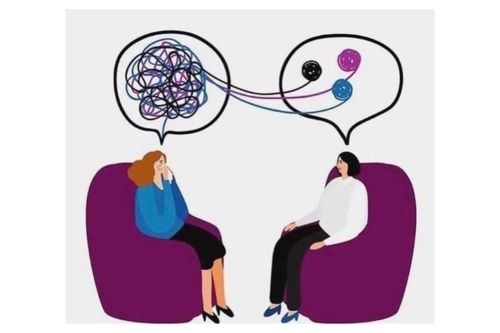
July 25th, 2024
By: Leanne D. Rondeau, Clinical Psychologist
“I became unraveled like the sweater that I knit twice; a sweater that I first made while I was on a youth exchange when I was twenty. I realized that the arms were too wide.
I made it once, unraveled it, and made it again.”
I have found that the image of becoming unraveled rings true for a lot of people seeking support and clarity through psychotherapy: the feeling of being like a bowl of various colours of yarn all meshed and messy; beautiful but not optimally functional.
To Take a Distance
Sometimes I ask people to give colours to the various aspects of their life’s challenges. I am surprised at how easy is for them to play along: “Ah! My work, that is pale yellow, and my kids, well, that’s bright pink! And my health challenges? Well, I just see that as a orange-brown mix.” The reasons behind these colour choices are always interesting. One could say we are getting into the unconscious here, but I am not sure. At the very least this way of looking at struggles allows us to take a distance, become more mindful of what we are living, see more clearly how various aspects of our lives interact, and how they are separate.
How Does This Work?
But what is therapy, and why is it helpful to slowly take things apart? How does this help with the tangles of life and the painful knots in which we find ourselves? Suffering in one form or another draws people to consult, and people’s expressed goals most often involve various ways of saying that they would like to reduce (or eliminate) that suffering. Is the process of psychotherapy as simple as detangling yarn, unravelling something even further only to make it whole once again?
Slowing Down
Neuropsychologist Louis Cozolino has spent the greater part of his career synthesizing the latest developments in neuroscience and writing about why therapy works. He envisions the process of psychotherapy as resulting in the integration of the various areas of the brain (higher-lower, right hemisphere and left). Areas that were stuck, so to speak, become unstuck. In his opinion what is needed for this integration to happen is for people to experience mild to moderate challenges within a supportive relationship. Our stress levels are often too high for there to be any meaningful neurological modifications. And we often feel alone in our suffering. Slowing down (and in good company!) most certainly lowers our level of activation to a level where change can occur.
Exchanging Competition for Compassion
Paul Gilbert, founder of Compassion Focused Therapy, would say that the therapeutic process involves therapists making space for people to be able to access their compassionate motivation and inner wisdom. People are often led by what he refers to as a competitive way of organizing their minds, comparing themselves with others, judging themselves harshly, and shaming themselves in the process. This results not only in emotional upset but also obscures people’s ability to see clearly. Unraveling with care can expose the limitations of comparing ourselves competitively. Curiosity and gentle questioning can create space for people to access their compassion and inner wisdom. Fresh answers emerge.
Letting Go of Shame
Disentangling our stories and letting go of our habits of pulling on knots and repeating competitive mantras involves a lot more than simply putting things in order. It does involve putting things in order but that order best be a compassionate order. Amongst the knots that become unstuck is most often the belief that there is something profoundly wrong with us (our shame). Gradually we begin to see ourselves from the outside as a just a simple human being who has been through challenging times. Slowly we begin to experience ourselves as someone we can cherish and love.
“I still have that sweater. One of my daughters used to wear it. I can’t really remember how it looked before I unraveled it. Amazing that I made it without a pattern.
But I had to make it twice.”
Cozolino, Louis. (2017). The Neuroscience of Psychotherapy: Healing the Social Brain (Third Edition). Norton Series on Interpersonal Neurobiology.
Cozolino, Louis. (2015). Why Therapy Works: Using Our Minds to Change our Brains. W.W. Norton & Company.
Gilbert, P. (2010). Compassion Focused Therapy, Distinctive Features. New York: Routledge.
Gilbert, P.; Choden (2013). Mindful Compassion, How the Science of Compassion Can Help You Understand your Emotions, Live in the Present, and Connect Deeply with Others. Oakland: New Harbinger Publications Inc.